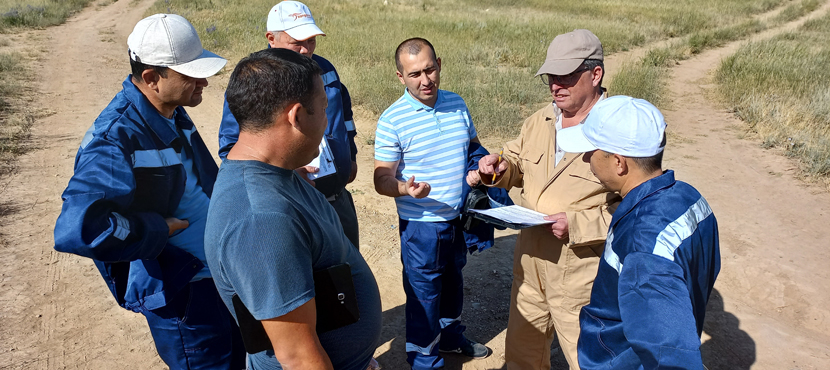Locust swarms can reach up to 10 billion individuals and travel up to 150 km in a day, devouring crops and threatening food supplies and livelihoods. According to the Food and Agriculture Organization of the United Nations (FAO), even a medium-sized swarm of locusts can destroy crops sufficient to feed 2,500 people for a year.
In Central Asia, during the past ten years, on an average, over four million hectares are treated annually with chemical insecticides against locusts. Indeed, locust control with insecticides is one of the most important tasks for the further sustainable development of agriculture. However, it is also important to mitigate the possible negative impact of insecticides on human health and the environment Monitoring and mitigating possible adverse effects was the main purpose of the mission of Harold van der Valk, FAO international consultant, Environmental expert, who visited Tashkent from 26 June to 7 July.
“I visited Uzbekistan to discuss the establishment of a human health and environmental monitoring system at the Agency of Plant Protection and Quarantine of the Republic of Uzbekistan. The system helps to assess possible side-effects of locust control with insecticides. It is a new system which is being introduced in different countries by FAO to make sure that locust control is done according to the right standards”, – Harold van der Valk told.
During the visit, the Environmental expert held meetings at the Agency of Plant Protection and Quarantine, the State Committee of the Republic of Uzbekistan on Ecology and Environmental Protection, the Ministry of Health, as well as at the other institutions involved in locust control. Participants of the meetings discussed challenges of locust control and the experience of Uzbekistan in this area, as well as measures currently being taken to reduce the negative impact of pesticides. According to Harold van der Valk, the main goal of these meetings was to assess the existing capacity of the country to carry out the above-mentioned monitoring, both in terms of experience and infrastructure.
During the visit, the FAO international consultant also conducted on-the-job training for specialists from the Agency of Plant Protection and Quarantine on monitoring the impact of pesticides used in locust control on the environment and human health. Practical classes were organized in the field in the Bostanlyk district of the Tashkent region. Participants simulated real locust control operations and received new knowledge and skills in conducting monitoring in accordance with international standards.
As a result of the mission, Harold van der Valk developed recommendations for improving the structure and approaches to monitoring and mitigating the impact of pesticides on human health and the environment in Uzbekistan. Such approaches will constitute the integral part of locust management activities in the country allowing to reduce the risks of insecticide applications and contributing to sustainable pest control.
